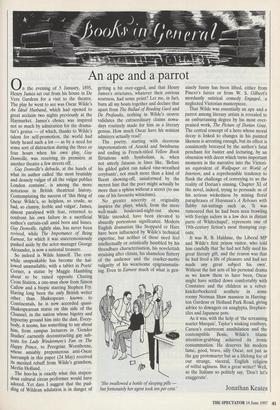An ape and a parrot
on the evening of 5 January, 1895, Henry James set out from his house in De Vere Gardens for a visit to the theatre. The play he went to see was Oscar Wilde's An Ideal Husband, which had opened to great acclaim two nights previously at the Haymarket. James's choice was inspired not so much by admiration for the drama- tist's genius — of which, thanks to Wilde's talent for self-promotion, the world had lately heard such a lot — as by a need for some sort of distraction during the three or four hours when his own play, Guy Domville, was receiving its premiere at another theatre a few streets off.
Guy Domville's debacle, at the hands of what its author called 'the most brutishly and densely vulgar of all the vulgar publics London contains', is among the more notorious in British theatrical history. Contemplating the success of 'this thing of Oscar Wilde's, so helpless, so crude, so bad, so clumsy, feeble and vulgar', James, almost paralysed with fear, returned to confront his own failure in a sacrificial author's curtain-call amid boos and hisses. Guy Domville, rightly alas, has never been revived, while The Importance of Being Earnest, for which it was unceremoniously pushed aside by the actor-manager George Alexander, is now a national treasure.
So indeed is Wilde himself. The erst- while unspeakable has become the hal- lowed unassailable, with a tablet in Poets' Corner, a statue by Maggie Hambling about to be raised opposite Charing Cross Station, a one-man show from Simon Callow and a biopic starring Stephen Fry. Having long been the only British writer other than Shakespeare known to Continentals, he is now accorded quasi- Shakespearean status on this side of the Channel, in the nation whose bigotry and hypocrisy ground him into the dust. Every- body, it seems, has something to say about him, from campus lecturers in 'Gender Studies' earnestly deconstructing gay sub- texts for Lady Windermere's Fan or The Happy Prince, to Peregrine Worsthorne, whose amiably preposterous anti-Oscar harrumph in this paper (24 May) received its merited rebuff from Wilde's grandson, Merlin Holland.
The hoo-ha is exactly what this stupen- dous cultural circus performer would have adored. Yet dare I suggest that the pud- ding of Wildean adulation is in danger of getting a bit over-egged, and that Henry James's strictures, whatever their envious sourness, had some point? Let me, in fact, burn all my boats together and declare that apart from The Ballad of Reading Gaol and De Profundis, nothing in Wilde's oeuvre validates the extraordinary claims nowa- days routinely made for him as a literary genius. How much Oscar have his noisiest admirers actually read? The poetry, starting with decorous impersonations of Arnold and Swinburne and ending in French-titled Yellow Book flirtations with Symbolism, is, when not utterly fatuous in lines like, 'Before his gilded galiot ran naked vine-wreathed corybants', not much more than a kind of fluent showing-off, uninformed by the merest hint that the poet might actually be more than a sphinx without a secret (to use one of his favourite witticisms).
No greater sincerity or originality inspires the plays, which, from the mere well-made boulevard-night-out shows Wilde intended, have been elevated to absurdly portentous significance. Modern English dramatists like Stoppard or Hare have been influenced by Wilde's technical expertise, but neither of these need feel intellectually or artistically humbled by his threadbare characterisation, his novelettish straining after climax, his shameless flattery of the audience and the cracker-motto vulgarity of his wearisome epigrammatis- ing. Even in Earnest much of what is gen- `She swallowed a bottle of sleeping pills but fortunately her agent took ten per cent.' uinely funny has been lifted, either from Pinero's farces or from W. S. Gilbert's mordantly satirical comedy Engaged, a neglected Victorian masterpiece.
That Wilde was essentially an ape and a parrot among literary artists is revealed to an embarrassing degree by his most over- praised work, The Picture of Dorian Gray. The central concept of a hero whose moral decay is linked to changes in his painted likeness is arresting enough, but its effect is consistently betrayed by the author's fatal penchant for banter and lecturing, by an obsession with decor which turns important moments in the narrative into the Victori- an equivalent of Wallpaper or World of Interiors, and a reprehensible tendency to flunk the challenge of conveying to us the reality of Dorian's sinning. Chapter XI of the novel, indeed, trying to persuade us of his serious wickedness by mixing florid paraphrases of Huysman's A Rebours with flabby tut-tuttings such as, 'It was rumoured that he had been seen brawling with foreign sailors in a low den in distant parts of Whitechapel', represents one of 19th-century fiction's most thumping cop- outs.
It was R. B. Haldane, the Liberal MP and Wilde's first prison visitor, who told him candidly that 'he had not fully used his great literary gift, and the reason was that he had lived a life of pleasure and had not made any great subject his own'. Without the last acts of his personal drama as we know them to have been, Oscar might have settled down comfortably with Constance and the children as a velvet- knickerbockered aesthete in some roomy Norman Shaw mansion in Harring- ton Gardens or Holland Park Road, giving advice to dowagers on anaglypta, fireplace- tiles and Japanese pots.
As it was, with the help of 'the screaming scarlet Marquis', Taylor's winking rentboys, Carson's courtroom annihilation and the contemptible Bosie, Wilde's titanic attention-grabbing achieved its ironic consummation. He deserves his modern fame, good, brave, silly Oscar, not just as the gay protomartyr but as a lifelong foe of our strange, visceral, English religion of wilful ugliness. But a great writer? Well, as the Italians so politely say, 'Don't let's exaggerate'.
Jonathan Keates










































































 Previous page
Previous page